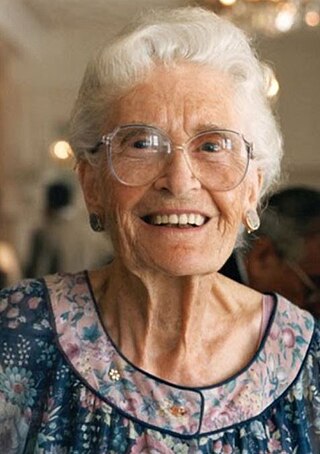Di Brandt often stylized as di brandt, is a Canadian poet and scholar from Winnipeg, Manitoba. She became Winnipeg's first Poet Laureate in 2018.
Dennis Cooley is a Canadian writer of poetry and criticism, a retired university professor, and a vital figure in the evolution of the prairie long poem. He was raised on a farm near the small city of Estevan, Saskatchewan in Canada, and currently resides in Winnipeg, Manitoba.
Susan Ioannou is a Canadian poet who lives in Toronto, Ontario.
Richard Stevenson was a Canadian teacher and poet. Stevenson taught English at Lethbridge College in Lethbridge, Alberta, and also taught in Nigeria for a few years.

Dorothy Kathleen May Livesay, was a Canadian poet who twice won the Governor General's Award in the 1940s, and was "senior woman writer in Canada" during the 1970s and 1980s.
Anne Szumigalski, SOM was a Canadian poet.

Sarah Klassen is a Canadian writer and retired educator living in Winnipeg, Manitoba. Klassen's first volume of poetry, Journey to Yalta, was awarded the Gerald Lampert Memorial Award in 1989. Klassen is the recipient of Canadian Authors Association Award for Poetry and Klassen's novel, The Wittenbergs, was awarded the Margaret McWilliams Award for popular history.
Laurie Block (1949–2018) was a Canadian poet and educator. Born in Winnipeg, Manitoba, he studied at the University of Winnipeg and the University of Manitoba.

Sheri-D Wilson, CM D. Litt, is a Canadian poet, spoken word artist, educator, speaker, producer and activist.

Jane Hirshfield is an American poet, essayist, and translator, known as 'one of American poetry's central spokespersons for the biosphere' and recognized as 'among the modern masters,' 'writing some of the most important poetry in the world today.' A 2019 elected member of the American Academy of Arts & Sciences, her books include numerous award-winning collections of her own poems, collections of essays, and edited and co-translated volumes of world writers from the deep past. Widely published in global newspapers and literary journals, her work has been translated into over fifteen languages.

Lenard Duane Moore in Jacksonville, North Carolina. He is a writer of more than 20 forms of poetry, drama, essays, and literary criticism, and has been writing and publishing haiku for more than 20 years.
John Barton is a Canadian poet.
Maurice Mierau is an American-Canadian writer of non-fiction and poetry. Born in Bloomington, Indiana, Mierau grew up in Nigeria, Manitoba, Jamaica, Kansas and Saskatchewan and has a Mennonite background. Mierau currently lives with his family in Winnipeg, Manitoba, and was president of the League of Canadian Poets from 2006-2008. Mierau holds an MA in English Literature from the University of Manitoba.

Marie Annharte Baker is a Canadian Anishnabe (Ojibwa) poet and author, a cultural critic and activist, and a performance artist/contemporary storyteller.
katherena vermette is a Canadian writer, who won the Governor General's Award for English-language poetry in 2013 for her collection North End Love Songs. Vermette is of Métis descent and originates from Winnipeg, Manitoba. She was an MFA student in creative writing at the University of British Columbia.
Tanis MacDonald is a Canadian poet, professor, reviewer, and writer of creative non-fiction. She is Professor at Wilfrid Laurier University with specialities in Canadian literature, women’s literature, and the elegy. She is the author of four books of poetry and one scholarly study, the editor of a selected works, and the founder of the Elegy Roadshow.
Rosanna Deerchild is a Canadian Cree writer, poet and radio host. She is best known as host of the radio program Unreserved on CBC Radio One, a show that shares the music, cultures, and stories from indigenous people across Canada, from 2014 to 2020. With CBC Radio One, she has hosted two other shows; The (204) and the Weekend Morning Show. She has also appeared on CBC Radio's DNTO. She has been on various other media networks: APTN, Global Television Network, and Native Communications (NCI-FM).
Ruth Collie, née Ruth Jacobs, was an English-born poet who started her writing career in Winnipeg, Manitoba. She was also known under her pen names Wilhelmina Stitch and Sheila Rand.
Juliane Okot Bitek, also known as Otoniya J. Okot Bitek, is a Kenyan-born Ugandan-raised diasporic writer and academic, who lives, studies and works in Vancouver, British Columbia, Canada. She is perhaps best-known for her poetry book 100 Days, a reflection on the 100-day 1994 Rwandan genocide, in which an estimated 800,000 Tutsi and Hutu people were killed. She has been a contributor to several anthologies, including in 2019 New Daughters of Africa: An International Anthology of Writing by Women of African Descent, edited by Margaret Busby.

ruth weiss, born Ruth Elisabeth Weisz, was a poet, performer, playwright and artist. Born in Germany, but of Austrian citizenship, weiss made her home and career in the United States. She was considered to be a member of the Beat Generation, a label she, in later years, embraced.







